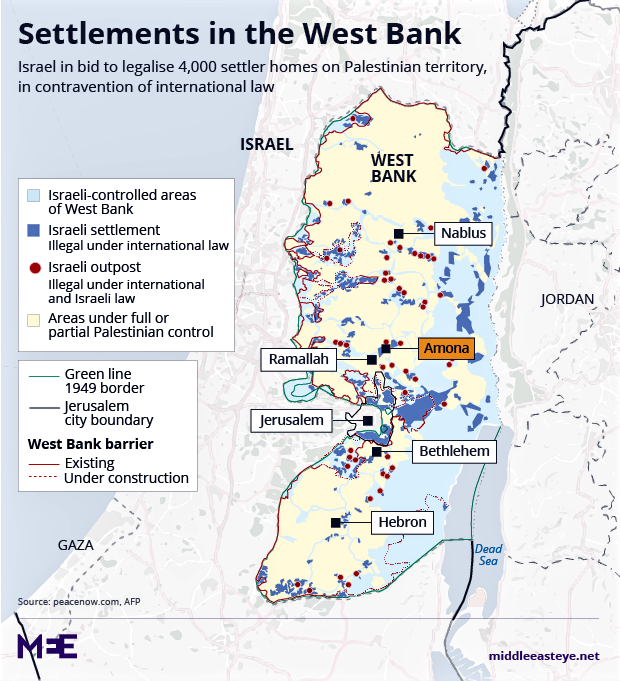'Carte blanche': Israelis hail Trump backing on illegal settlements
Israeli officials welcomed on Friday what they took as US consent to expand existing settlements, after the White House reversed a long-standing policy of condemning building on occupied land.
In its first substantive announcement on the Israeli-Palestinian conflict, the administration of US President Donald Trump said it did not see existing settlements hampering peace with the Palestinians, although it recognised that "expansion of existing settlements beyond their current borders may not be helpful in achieving that goal".
At one level, that appeared to be an attempt to rein in Israel's prime minister, Benjamin Netanyahu, who has announced wide-ranging settlement expansion plans since the 20 January inauguration, including about 6,000 new homes.
|
But the statement also softened US policy under Trump's predecessor, Barack Obama, and even George W Bush as it suggested that a peace deal was attainable with existing settlements, which are considered illegal by the international community, remaining in place.
The statement also said: "The Trump administration has not taken an official position on settlement activity" - a tacit refusal to support international law, which states moving settlers to land occupied through war is forbidden.
"Netanyahu will be happy," a senior Israeli diplomat told the Reuters news agency. "Pretty much carte blanche to build as much as we want in existing settlements as long as we don't enlarge their physical acreage. No problem there."
Israel's deputy foreign minister, Tzipi Hotovely from the right wing of Netanyahu's Likud party, interpreted it in a similar way, saying construction in the occupied West Bank and East Jerusalem, which the Palestinians want for their own state together with Gaza, would go on unhindered.
"It is also the opinion of the White House that settlements are not an obstacle to peace and, indeed, they have never been an obstacle to peace," she said. "Therefore, the conclusion is that more building is not the problem."
Israel seized the West Bank and East Jerusalem in the 1967 Middle East war. The 50th anniversary of the occupation, which Israel marks as a reunification of Jerusalem, is in June.
There was no immediate comment from the Palestinians.
Oded Revivi, the chief foreign envoy of the Yesha settlers' council, told the AP news agency his group "thanks the White House for asserting that our communities were never an impediment to peace." Using the biblical name for the West Bank he said "nothing is more natural and morally just than Jews building in Judea."
Full White House statement
The full Trump administration statement says: "The American desire for peace between the Israelis and the Palestinians has remained unchanged for 50 years.
"While we don’t believe the existence of settlements is an impediment to peace, the construction of new settlements or the expansion of existing settlements beyond their current borders may not be helpful in achieving that goal.
"As the President has expressed many times, he hopes to achieve peace throughout the Middle East region. The Trump administration has not taken an official position on settlement activity and looks forward to continuing discussions, including with Prime Minister Netanyahu when he visits with President Trump later this month."
Netanyahu is due to meet Trump in the US on 15 February, amid speculation that they will discuss plans to relocate the US embassy in Tel Aviv to Jerusalem - a move that has alarmed many in the Middle East.King Abdullah of Jordan reportedly told Trump on Thursday that doing so would damage hopes of a peaceful settlement between Palestinians and Israelis.
Silent approval
Since taking office, Trump has largely kept quiet on the Israeli-Palestinian issue, making no comment in response to Netanyahu's announcements for thousands more settler homes, a silence interpreted as endorsement. During the campaign, Trump said he would not interfere or push Israel to negotiate on a two-state solution to the conflict.
He has nominated David Friedman as ambassador to Israel, who has raised money for the settlements and supports moving the US embassy to Jerusalem.
Under Barack Obama, the White House maintained a firm anti-settlements line, calling them illegitimate and an obstacle to peace. Most of the world considers settlements illegal under international law, a position Israel rejects.
The EU and Britain issued statements this week criticising Netanyahu's settlement plans, which they see as further breaking up the West Bank and undermining the possibility of a contiguous Palestinian state ever emerging.
While most of the 6,000 settler homes Netanyahiu has promised are in existing blocs, many are not and may have to be scrapped if he wants to adhere to the White House line.
Stay informed with MEE's newsletters
Sign up to get the latest alerts, insights and analysis, starting with Turkey Unpacked
Middle East Eye delivers independent and unrivalled coverage and analysis of the Middle East, North Africa and beyond. To learn more about republishing this content and the associated fees, please fill out this form. More about MEE can be found here.





